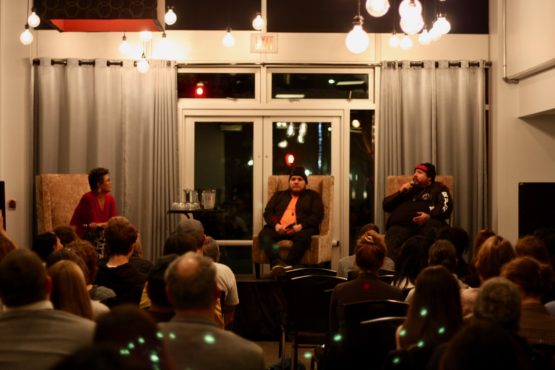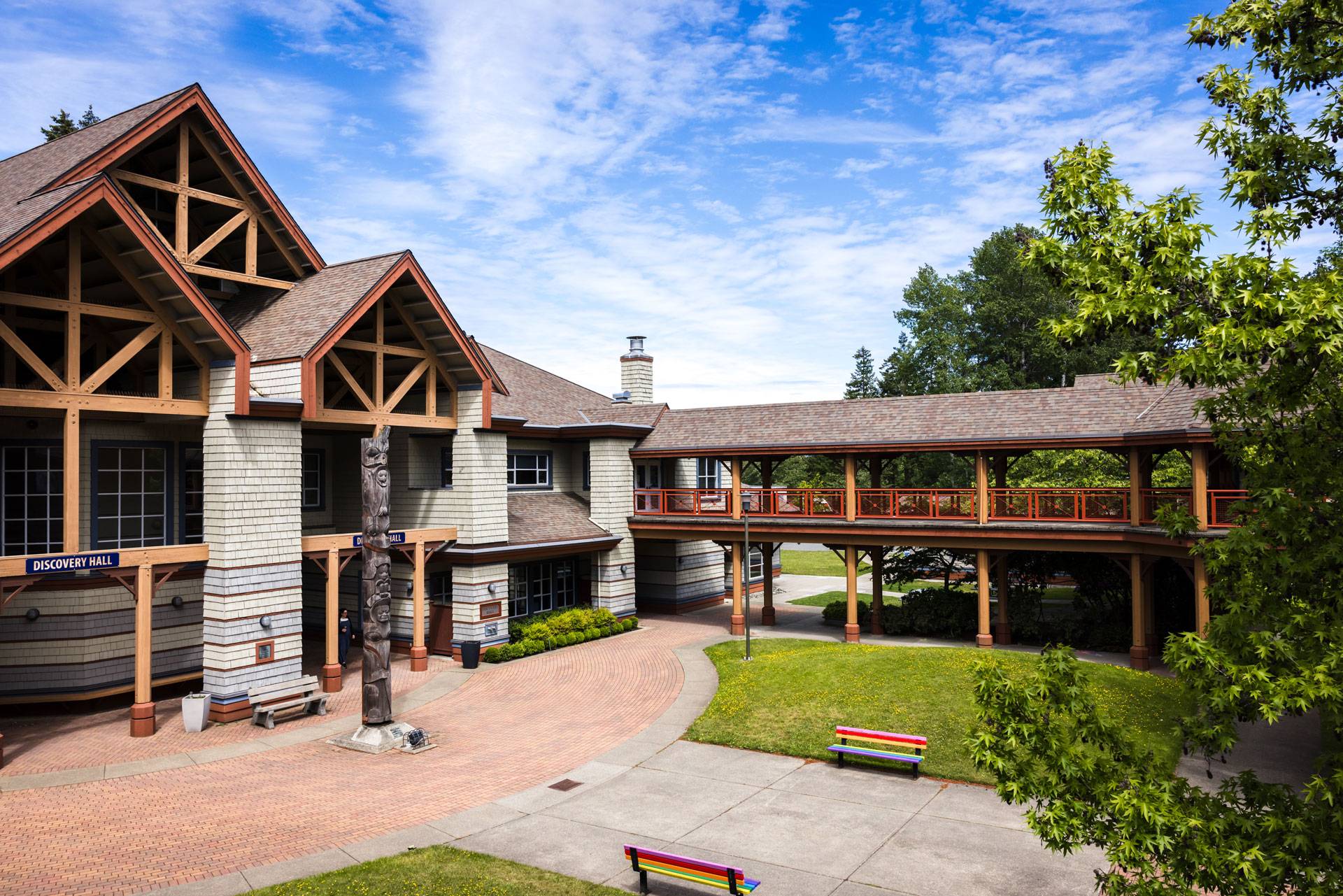VIPIRG’s 3rd annual conference “Cracks in the Concrete” sells out

A Tribe Called Red in conversation with Mohawk/Tuscarora poet and writer Janet Rogers. Photo by Anabelle Budd, Editorial Assistant
The Vancouver Island Public Interest Research Group (VIPIRG) hosted their third annual conference on March 16–18. Titled New Reflections, Ongoing Conversations, the conference culminated in an evening panel discussion with Canadian DJ collective A Tribe Called Red on Saturday.
Friday and Saturday afternoon saw four panel discussions on the topics of non-profits, environmentalism, Indigenous governance, and deaf culture.
At the panel on Indigenous governance, the speakers challenged the audience to ask themselves how their time here will benefit the land and the community, and to remember that the word “ally” should be used as a verb, in that it is something that you have to be cognizant of doing every day, rather than a noun.
Saturday evening kicked off with performances from Victoria Youth Poet Laureate Agartu Ali and local musicians Paint the Town Red, DJ Vinnie Buggati, and LOOELLE. Beyond art and creative expression, a common theme of the night was a reflection on the diversity of the audience at the sold-out event.
“This room is way more diverse than the streets of Victoria,” said emcee Sharmarke Dubow to over 100 audience members. “My heart is full tonight.”
At 8:00 p.m., A Tribe Called Red came onstage with Mohawk/Tuscarora poet and writer Janet Rogers to talk about their work, its connection to social issues, and the concept of creative resistance.
As described on the group’s website, A Tribe Called Red acts as “a modern gateway into urban and contemporary indigenous culture and experience, celebrating all its layers and complexity.”
In their conversation with Janet Rogers, members Bear Witness and Tim 2oolman discussed their musical background, the 2016 album We are the Halluci Nation, the group’s role in the Idle No More movement, and the future of First Nations’ relationships with Canada.
“If there were anthems to Idle No More, it was these guys,” Janet Rogers told the packed house. “You created the perfect marriage between lyrics and energy and beats to keep us going.”
In response to this praise, Bear Witness expressed gratitude but stressed that A Tribe Called Red is so much bigger than just the sum of its parts because it is carried and shaped by the community behind it.
“We’re riding the wave, but the wave is formed by the community,” he said.
As for the future of the movement? The group directs us to their track We Are the Halluci Nation, structured around a poem by John Trudell that emphasizes being human again and what it means to be a part of everything around us.
“A Tribe Called Red is an artistic organization able to promote social justice through their own music, through their expression” – Dakota McGovern
After the panel, Bear Witness conveyed the importance of having spaces and opportunities like these for people to share their own voice, and also commented on the diversity of the crowd.
“There was a really wide range of people today” he said. “People being able to share their own voice . . . is the general connection between all of us.”
When asked about A Tribe Called Red’s participation in this conference, VIPIRG Outreach Coordinator Dakota McGovern explained that VIPIRG “[always tries] to centre alternative voices to the mainstream social justice dialogue.”
Says McGovern, “A Tribe Called Red is an artistic organization . . . able to promote social justice through their own music, through their expression.”
VIPIRG, meanwhile, is a not-for-profit, student-funded and volunteer-driven community research and organizing group, with a mandate to promote social and environmental justice through student-led research projects.
“We believe that community engagement is not something that’s differentiated from research, but it goes hand in hand,” explains McGovern.
In fact, VIPIRG engages in research with the hope of changing public policy to make life better for UVic students and the greater Victoria community. And if you have your doubts about participating in next year’s conference, McGovern emphasized that VIPIRG is redefining the concept of a conference by moving away from typical meetings and boards.
“We want to bring people from outside the choir to this room,” he says. “We don’t want to say the same old things to the same old group of folks. We want new people to come in and to experience this discussion.”
Thanks for reading! If you enjoyed this article and would like to make sure we keep writing articles like it, please consider supporting us on the Martlet 70 fundraiser’s GoFundMe page.
If you hated the article, though, you should still donate to the GoFundMe page (so we can hire better writers).






